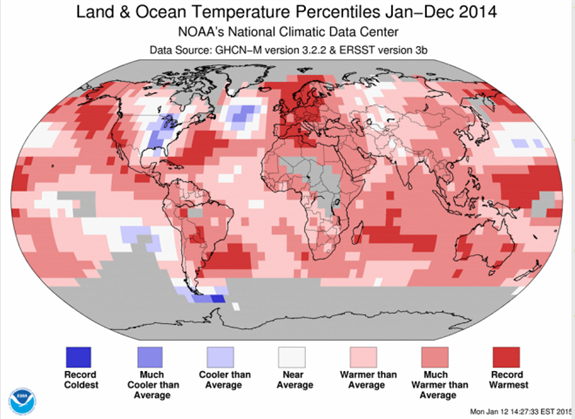Roz Pidcock
16.01.2015 | 3:45pmNASA and the US National Oceanic and Atmospheric Administration (NOAA) have confirmed 2014 was the warmest year since records began in 1880.
Global temperature in 2014 was 14.68 degrees Celsius, or 0.69 degrees above the 20th century average, according to NOAA scientists.
The 10 warmest years in the instrumental record, with the exception of 1998, have now occurred since 2000.
2014 appears to narrowly beat 2005 and 2010 to the top spot. This is notable as, unlike those years, 2014 did not see a strong El Niño.
However, the difference is within the range of uncertainty so, statistically-speaking, the three years probably tie for hottest year on record.
Global annual average temperature, with land and ocean components. Since 1880, Earth’s average surface temperature has warmed by about 0.8 degrees Celsius. Source: NOAA
A NOAA press release describes the widespread warming across the globe in 2014:
“Record warmth was spread around the world, including Far East Russia into western Alaska, the western United States, parts of interior South America most of Europe stretching into northern Africa, parts of eastern and western coastal Australia, much of the northeastern Pacific around the Gulf of Alaska, the central to western equatorial Pacific, large swaths of northwestern and southeastern Atlantic, most of the Norwegian Sea, and parts of the central to southern Indian Ocean.”
Director of the NASA Goddard Institute of Space Sciences, Gavin Schmidt, says:
“This is the latest in a series of warm years, in a series of warm decades. While the ranking of individual years can be affected by chaotic weather patterns, the long-term trends are attributable to drivers of climate change that right now are dominated by human emissions of greenhouse gases.”
Too close to call
It is not possible to calculate the global average temperature anomaly with perfect accuracy. Many factors make it a less-than-straightforward task, such as sparse data in remote places, random measurement errors and changes in instrumentation over time.
The temperature difference between 2014 and 2005 or 2010 – just four hundredths of a degree – is less than the accuracy with which this kind of measurement can be made.
That means that while 2014 nominally takes the top spot, scientists can’t know for certain that it was warmer than 2005 or 2010.
But, importantly, the temperature record in 2014 occurred despite only a weak showing from the natural climate phenomenon known as El Niño. By contrast, 2010 and 2005 saw the 6th and 12th strongest El Niño on record, respectively.
The year 2014 ranks as Earth’s warmest since 1880. Source: NASA
No-show El Niño
In El Niño years, the ocean releases heat into the atmosphere, adding to the warming we’re already seeing from greenhouse gases. This makes El Niño years among the warmest on record. Despite strong initial signs last year, El Niño is now looking less likely after scientists lowered the chances of an event in the next two months to 50 or 60 per cent.
Professor Kim Cobb from the Georgia Institute of Technology told Carbon Brief recently:
“From an impacts perspective, it is important to remember that even modest El Niño warmings, such as that currently underway in the central tropical Pacific, occur on top of an overall warming trend. To illustrate this point, 2014 will likely be the warmest year on record, even though it is only a weak El Niño year, thus beating out the strong El Niño event of 1998”.

Source: NOAA/NASA Annual Global Analysis for 2014
Three out of four
Scientists use four major datasets to study global temperature. The official data is usually ready in January of the following year, but the four meteorological agencies do not release the official figures at the same time.
Today is the turn of NASA and NOAA, with the UK Met Office/University of East Anglia (UEA) following suit next week. The Japan Meteorological Agency (JMA) produces the fourth.
The JMA and the Met Office/UEA both released provisional figures in recent months, putting 2014 on course to take the top spot. Final figures are expected from JMA in early February.
For more on the four different datasets and what goes into taking earth’s temperature, read our background briefing here.

